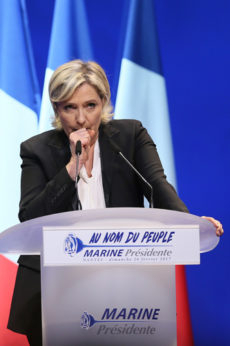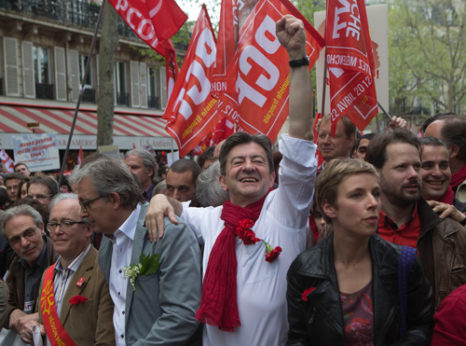
This spring, the people of France will go to the polls to replace deeply unpopular President François Hollande and choose a new National Assembly. Set against the backdrop of high unemployment, slow economic growth, a string of terror attacks, and the influx of refugees from the Syrian civil war, this year’s elections have less to do with politicians or parties than with a clash of visions for France’s future.
At issue are France’s place in the European Union, its openness to immigrants and refugees, and the fate of a social model based on strong protections for workers and the unemployed.
The Hollande years and the rise of the far right
Current president François Hollande hails from the pro-business wing of the center-left Socialist Party. He was elected in 2012, with the support of the Left Front coalition, on a promise to protect social programs and renegotiate an EU treaty that places stringent fiscal limits on France.
Despite his campaign rhetoric, Hollande’s economic policy was textbook neoliberalism. The signature achievements of his time in office were two laws that met with massive protest from labor and the left.
The Macron Law, proposed by Minister of the Economy Emmanuel Macron, weakened protections for workers’ time off and privatized billions of Euros’ worth of state-controlled assets.
The El Khomri Law, named for the Minister of Labor but often referred to as the Loi Travail, or Work Law, modified labor law to dramatically increase the power of employers in negotiating with labor unions. It also capped the legal penalties payable to workers in cases of unfair termination.
The Macron law met with protest, but the El Khomri Law faced a backlash that nearly paralyzed the country, as the CGT [General Confederation of Labor], France’s most powerful union federation, took to the streets. In the end, the government used a rarely-invoked constitutional provision to force the law through the National Assembly without debate.
Discontent with Hollande, and with Prime Minister Manuel Valls, has also been fueled by a string of terror attacks in France and by the imposition of a “state of emergency,” restricting civil liberties and giving the government expanded policing powers, that has been in place since November 2015.
Christiane Taubira, France’s first Black woman Minister of Justice and the voice behind a landmark marriage equality law passed in 2013, resigned from the government in protest of a constitutional reform that would allow the government to strip native-born French citizens of their citizenship.
Finally, France is divided over how to respond to the influx of refugees from the Syrian civil war. Fear mongering from the far right was expected, but even the ruling Socialist Party took a xenophobic tone, with then-Prime Minister Valls warning that migrants were a threat to the very idea of Europe.
Critics from the left, like Communist and MEP [Member of European Parliament] Patrick Le Hyriac, insist that Europe has an obligation to welcome those refugees, and that immigration is a source of cultural wealth rather than a threat. Towns around France have organized independent initiatives to welcome refugees and integrate them into the life of the community.
It is in this fraught political climate that we have to understand the rise of the far-right Front National [FN] led by Marine Le Pen.
During Hollande’s presidency, the FN moved even further into the mainstream of French politics. Its politics are roughly equivalent to the Trump wing of the Republican Party: racist, anti-immigrant, against participation in the European Union, opposed to equality for women and LGBTQ people, pro-military, and pro-police.
But, like Trump, they drape their reactionary politics in populist pandering. To give a sense of how cynically the Front National capitalizes on economic insecurity, a recent publicity campaign showed white people with traditional French names, each facing economic hardship. On each is a slogan like, “Too bad for Pierre, he’s not an immigrant,” along with a misleading statement about social benefits available to immigrants.
The coming showdown

French elections happen in two rounds: a first round open to all candidates and a runoff between the top two vote-getters of the first round. Based on current polling, the FN’s Marine Le Pen stands to capture almost 30 percent of the vote in the first round, but is unlikely to win in a runoff.
François Fillon, from the socially conservative, pro-business Republicans, was positioned as the second-place candidate of the first round until a corruption scandal compromised his credibility with voters.
Instead, current polls show Emmanuel Macron in second place. Macron is a young, charismatic former minister running as an independent. (His movement, En Marche! [Moving Forward!], is named for his own initials.) Macron is progressive on immigration, LGBTQ rights, and the legacy of French colonialism, which he calls “a crime against humanity.” However, he has drawn the ire of labor for the anti-worker, pro-austerity policies he pursued during his time as Minister of the Economy. Macron consistently leads Fillon by a few points in the polls.
The Socialist Party primary election produced a surprise victory for Benoît Hamon, a young frondeur [rebel] who was fired as Minister of Education after criticizing the economic policies of President Hollande and Prime Minister Valls. Hamon has called for a “renegotiation of the meaning of work,” with proposals like a universal basic income, support for innovation, and measures to protect workers from burnout.

Finally, Jean-Luc Mélenchon, of the far-left France Insoumise [Rebellious France] movement stands at fifth place in current polls. In November, the membership of the French Communist Party (PCF) voted to support Mélenchon’s campaign rather than running its own independent candidate.
Left unity and a progressive majority
In a statement released just after François Fillon’s disgrace and Benoît Hamon’s victory in the Socialist primary, the Communist Party’s national executive committee interpreted the results as a rebuke to those trying to portray a right vs. far right, Fillon-Le Pen “nightmare” as a foregone conclusion for the elections.
“The women and men of France…are speaking out,” PCF leaders noted, “refusing to simply accept the offered scenarios, refusing to follow certain politicians down the blind alley of their policy proposals.”
Pierre Laurent, National Secretary of the PCF, has emphasized the need to unmask politicians who hide a reactionary agenda with a veneer of social concern. Marine Le Pen, whom Laurent accused of giving the far-right agenda a “social makeover,” sits atop that list. However, Laurent added, the left needs to show Emmanuel Macron’s platform for what it is: an “Uberization of society,” where working people face increasing insecurity.
French Communists continue to pursue a policy of “convergence” on the left, calling for public discussion among all anti-right, anti-austerity forces (including independents, Socialists, and Greens) to establish a common agenda based on regulation of the financial sector, support for social welfare programs, and sustainable industrial development.
Beyond a set of shared ideas, such an agenda would lay the basis for a progressive majority in the legislature. The PCF sees winning such a majority as essential to preserving social security, protecting workers’ rights, and saving the institutions of the French Republic from the far-right onslaught.









